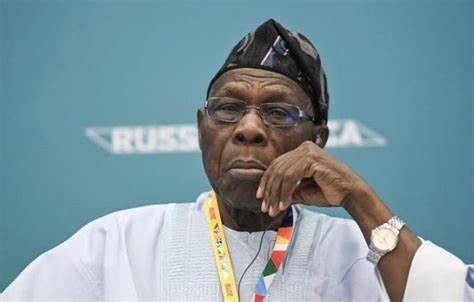Hot Stories
Recent Stories
Africa’s Poverty Not An Act Of God — Obasanjo
Posted by Thandiubani on Tue 27th Aug, 2024 - tori.ngObasanjo made this statement on Monday at the opening ceremony of the FESTAC Africa Festival at the Jomo Kenyatta Stadium in Kisumu, Kenya.

Former Nigerian President Olusegun Obasanjo has spoken about the widespread poverty in Africa.
According to him, the poverty in Africa is not an act of God but man-made.
Obasanjo made this statement on Monday at the opening ceremony of the FESTAC Africa Festival at the Jomo Kenyatta Stadium in Kisumu, Kenya.
The former head of state remarked that, given the continent’s abundant resources, there is no reason for its poverty.
He said, “Africa has no reason to be poor. Our poverty is not an act of God. We are steeped in poverty due to our poor mentality. We need to wake up because we have a wealth of resources.
“If you look back in history, you will see that whenever others needed to get work done, they came to Africa to transport black people to the so-called New World to make others rich. And that hasn’t stopped. The slave trade led to colonialism. We enrich others while remaining impoverished. We need to awaken.
“Structural adjustment was the idea of the World Bank. However, I disagreed because we lacked the structure. What exactly were we adjusting? They were simply deceiving us.”
Obasanjo also expressed nostalgia at the return of the Festival of Arts and Culture, whose second edition was held in Nigeria during his tenure as military head of state in 1977. The first edition of the widely acclaimed festival was held 11 years earlier in Dakar, Senegal, in 1966.
Recalling his experience when the festival was held in Nigeria 47 years ago, the former president said, “I am here to express my appreciation and thanks, first to the governor of Kisumu County, Anyang Nyong’o, for hosting FESTAC here and contributing to what I call a renaissance and rebirth of FESTAC. I feel a bit emotional because, as you heard, the first festival was held in Senegal in 1966, and there was no other for 11 years.
“Nigeria agreed to stage another edition of the festival in 1975. Despite preparations, a change of government led some people to suggest cancelling it. However, I insisted that we should proceed and successfully hosted it.”
He added that the event attracted black people from all over the world, including Papua New Guinea, Australia, and the United States, and was a success.
Obasanjo also acknowledged that the event was suspended for over four decades because “it was left entirely in the hands of the government.”
Returning as a democratically elected president from 1999 to 2007, Obasanjo commended Yinka Abioye, Chairman of FESTAC Africa International, for his tenacity and commitment.
He said, “At this juncture, I would like to commend Yinka (Abioye) for his efforts and determination in reviving FESTAC during my lifetime.”
At one point in his speech, Obasanjo called on former Kenyan Prime Minister Raila Odinga to join him on stage.
“My brother, come and join me on stage. You cannot bring me here and then abandon me,” he joked.
Calling for support for Odinga’s ambition to become Chairperson of the African Union Commission, Obasanjo said, “At FESTAC ’77, black people who were marginalised and exploited came together. Sadly, that marginalisation continues. I believe it will persist until we unite. The renaissance of FESTAC is part of the process of unification.
“Unless the AU as a continental organisation achieves success with the continental free trade agreement, we won’t progress. The AU itself needs reform. How can they develop programmes and wait for the European Union to provide funding? I was appointed as the AU’s High Representative for the Horn of Africa (a region in East Africa consisting of Kenya, Ethiopia, and Somalia). When appointed, the AU had no funds for me to perform my role.
We waited for the US, EU, Germany, and other countries to provide money. Due to my connections, I approached the head of the African Development Bank, who provided some funds, enabling us to achieve progress in Ethiopia. Yet, the AU could not provide even that $500,000.
“We need individuals who understand Africa’s problems and the role the AU should play. I believe Raila Odinga is that person. He understands Africa’s issues because we have worked together on these problems before.”
He also stated that although Africa has achieved political liberation, it has not yet attained economic freedom.
“That’s why we need someone like Odinga to lead the AU and provide the reform and leadership necessary to achieve economic liberation for Africa,” he added.
Further, he advised African leaders to stop accepting Western ideas that do not work for the continent.
He said, “We have everything needed to create wealth. No one will do it for us. We must do it ourselves. If we don’t act, we are sitting on a keg of gunpowder. Our youth are restless, unhappy, bitter, angry, unemployed, and dissatisfied.
“They cannot wait for a long-promised future. They want action now. If we fail to deliver, we will be in trouble. However, we can meet their needs because we have the capability.”
Top Stories
Stories from this Category
Recent Stories













































